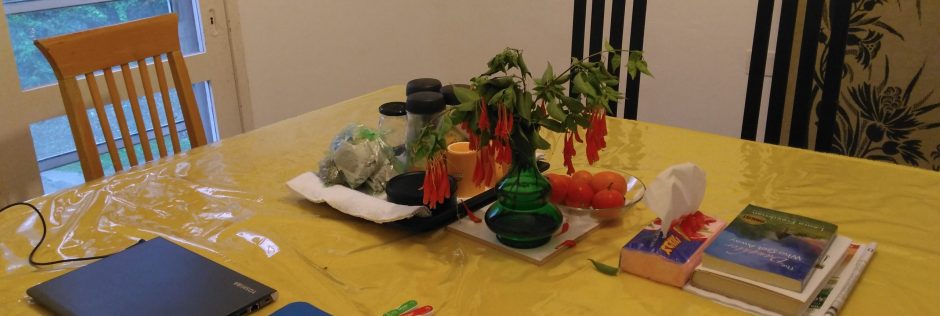
It could be disorienting, changing from being immigrants to established professionals. Once his dental practice was successful, Morris bought part of a brownstone on Clinton Avenue in Brooklyn. The living room had pale green silk wallpaper and carved wainscoting. A wide staircase spiraled to the upper floors. For a while after they moved in, the Feuersteins—Flora, Morris, and their sons Jerry, Evan, and Martin–lived almost entirely upstairs, descending to the kitchen by way of the back stairs meant for servants.
One Saturday morning as they sat eating their breakfast in the nook off the kitchen, Morris announced, “This is ridiculous. We’re going to live as we’ve always lived.” Then they all got up and carried their bowls of breakfast cereal down the spiral staircase and into the rose-silk lined dining room. The boys grew to like living in the brownstone: The oldest brother Jerry played kick-the-can with the kids on the street; Evan explored the extensive library, and Martin did chemistry experiments in one of the marble-lined bathrooms.
Once the neighborhood “changed” around the brownstone, which meant it got worse, Morris moved the family to a ninth-floor apartment on Central Park West. There were an elevator man and a doorman wearing serge suits with shiny buttons, and all the inhabitants went in and out in suits and mink coats. The boys hated having to wear their uncomfortable little suit jackets whenever they went “down,” which meant down to the street for any reason. Morris too didn’t like wearing a jacket and tie. Finally one day Morris announced, “We’ll live as we’ve always lived, and they’ll get used to it.” The boys went back to wearing their old corduroys and Flora stopped paying much attention to how well dressed they looked. Rather than hiring an interior decorator, Morris and Flora jumbled their ever-increasing art collection together in whatever way pleased them, and the new home became as comfortable as it was luxurious.
By the time the youngest son Martin was a medical intern, his clothing was very shabby, as Flora didn’t notice, assuming he would take care of such things. When Gayle first met her future husband Martin, he was wearing a coat with a hole in it, shoes with a hole, and trousers with frayed cuffs. Gayle was also a medical intern at the same hospital, and her mother was concerned that she should marry soon. “You’ll marry a rich boy,” she’d told Gayle, who decided at that moment to marry the poorest boy she could find. In her mind, this poor and romantic boy looked like Martin. They met at the hospital and fell in love. Gayle was proud of knowing nothing about this boy’s family; she never asked for details of his parents’ lives or occupations, not wanting to shame him. He just told her stories about his brother Jerry’s pet rats and his own home-chemistry experiments.
On Passover, Martin invited her home to meet his parents. Gayle was confused by the Central Park West address and the doorman. Maybe Martin’s family were living with someone else temporarily? At the apartment door Martin turned to Gayle and said, “By the way, there are a lot of pictures in there.” This was an understatement, as the foyer alone held seventy-two original paintings. The meeting with his parents was a success, and the two of them married. Eventually they too became well off, but they continued to live as they’d always lived.
Copyright © Leora Freedman 2014
***If you have something to say, or a story to share, our comments page is the place to leave it!
 Copyright secured by Digiprove © 2014 Leora Freedman
Copyright secured by Digiprove © 2014 Leora Freedman 
